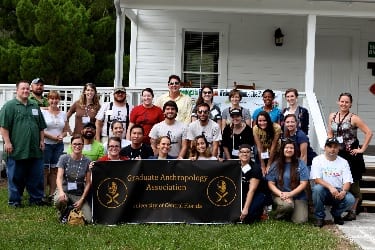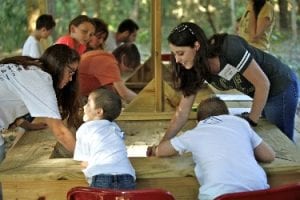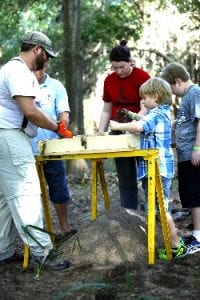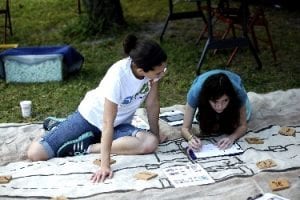Archeologists Dig Up Support for Autism
On October 24th, the UCF Department of Anthropology volunteered at the second annual Archeologists for Autism event. Faculty and graduate students spent a fun-filled day with autistic children, providing them with hands-on archeological experiences.
Archaeologists for Autism is a non-profit organization that allows children on the autism spectrum to participate with and engage in archaeology in a safe, fun, and experiential manner. Archeologists for Autism’s mission is to unlock the potential of children with developmental disabilities. They work to provide children with autism spectrum disorders a chance to experience archeology in a fun, low stress environment, all at no cost to the families.
Tom Penders, an archeologist for Cape Canaveral, founded Archeologists for Autism in 2014. With an autistic daughter of his own, it was difficult to find activities for her to take part in; he wanted to create an event that autistic kids could, not only participate in, but would also enjoy.
The 345 participants who registered and attended the event received free lunch and could come and go as they pleased. All the goods and vendors were based on in-kind donations.
The Graduate Anthropology Association had 20 volunteers come out to the event. Included in these volunteers were 4 faculty members, Sandra Wheeler, Ph.D., Stacy Barber, Ph.D., J. Marla Toyne, Ph.D., and John Starbuck, Ph.D., 5 undergraduate volunteers and several UCF alumni. The volunteers worked at the various stations and taught the children and families about archaeology.
Several other groups, including the National Park Service, Florida Archaeology Network, and faculty and staff from the Florida Museum of Natural History were also at the event to help demonstrate. The Florida Anthropological Society were also a major partner and donor to this event.
Held at the historic Sam’s House on Pine Island, in Merritt Island, Florida, children and their families were able to walk the grounds of this conservation area and participated in an actual archeological excavation in the park.
They excavated fossils, mapped a mock shipwreck, studied animal bones, practiced the art of ancient pottery and many other fun activities related to archeology and paleontology. Some of the most popular activities were the fossil and artifact excavation, the fossil making and the spear throwing with Atlatls.
Children were able to use their social skills, and various functional skills to learn about archeology, all while having fun.
“I have worked with the students and faculty from the department of anthropology since 2008. They work with me doing archaeological surveys, [they] assist me as the archaeologist at Cape Canaveral Air Force Station, as well on my research projects on weekends [and] [f]or the past 2 years we have worked together on Archaeologists for Autism.” states Penders, “In my 31 years of doing archaeology, the graduate students are some of the finest young men and women I have worked with. I couldn’t do what I do without them.”
Throughout the event, in addition to the various archeological activities, there was all-day face-painting and live Native American-style flute music for the participants to enjoy.
Archeologist for Autism 2016 will be held on November 19th, 2016.




